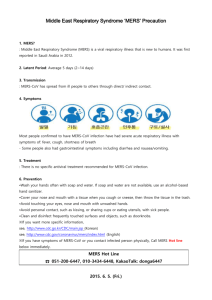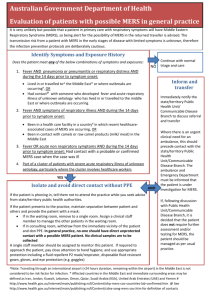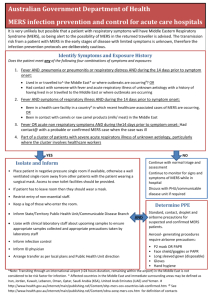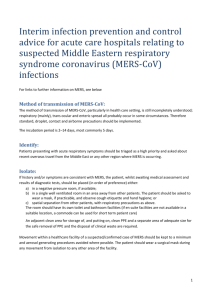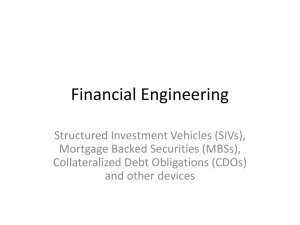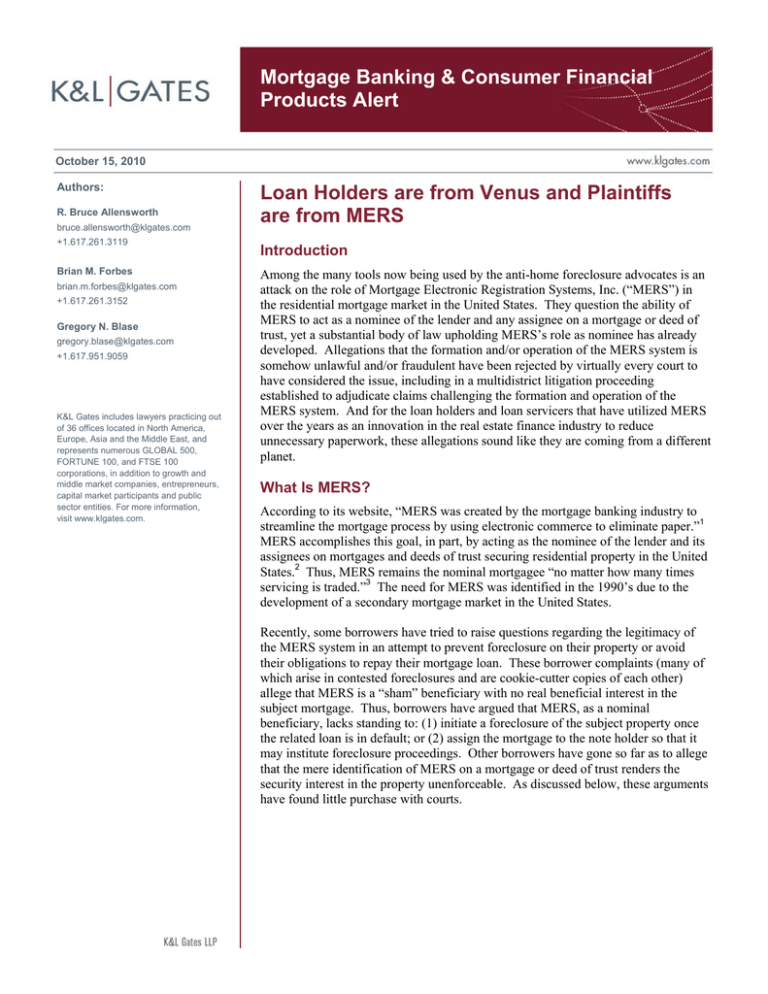
Mortgage Banking & Consumer Financial
Products Alert
October 15, 2010
Authors:
R. Bruce Allensworth
bruce.allensworth@klgates.com
+1.617.261.3119
Brian M. Forbes
brian.m.forbes@klgates.com
+1.617.261.3152
Gregory N. Blase
gregory.blase@klgates.com
+1.617.951.9059
K&L Gates includes lawyers practicing out
of 36 offices located in North America,
Europe, Asia and the Middle East, and
represents numerous GLOBAL 500,
FORTUNE 100, and FTSE 100
corporations, in addition to growth and
middle market companies, entrepreneurs,
capital market participants and public
sector entities. For more information,
visit www.klgates.com.
Loan Holders are from Venus and Plaintiffs
are from MERS
Introduction
Among the many tools now being used by the anti-home foreclosure advocates is an
attack on the role of Mortgage Electronic Registration Systems, Inc. (“MERS”) in
the residential mortgage market in the United States. They question the ability of
MERS to act as a nominee of the lender and any assignee on a mortgage or deed of
trust, yet a substantial body of law upholding MERS’s role as nominee has already
developed. Allegations that the formation and/or operation of the MERS system is
somehow unlawful and/or fraudulent have been rejected by virtually every court to
have considered the issue, including in a multidistrict litigation proceeding
established to adjudicate claims challenging the formation and operation of the
MERS system. And for the loan holders and loan servicers that have utilized MERS
over the years as an innovation in the real estate finance industry to reduce
unnecessary paperwork, these allegations sound like they are coming from a different
planet.
What Is MERS?
According to its website, “MERS was created by the mortgage banking industry to
streamline the mortgage process by using electronic commerce to eliminate paper.”1
MERS accomplishes this goal, in part, by acting as the nominee of the lender and its
assignees on mortgages and deeds of trust securing residential property in the United
States.2 Thus, MERS remains the nominal mortgagee “no matter how many times
servicing is traded.”3 The need for MERS was identified in the 1990’s due to the
development of a secondary mortgage market in the United States.
Recently, some borrowers have tried to raise questions regarding the legitimacy of
the MERS system in an attempt to prevent foreclosure on their property or avoid
their obligations to repay their mortgage loan. These borrower complaints (many of
which arise in contested foreclosures and are cookie-cutter copies of each other)
allege that MERS is a “sham” beneficiary with no real beneficial interest in the
subject mortgage. Thus, borrowers have argued that MERS, as a nominal
beneficiary, lacks standing to: (1) initiate a foreclosure of the subject property once
the related loan is in default; or (2) assign the mortgage to the note holder so that it
may institute foreclosure proceedings. Other borrowers have gone so far as to allege
that the mere identification of MERS on a mortgage or deed of trust renders the
security interest in the property unenforceable. As discussed below, these arguments
have found little purchase with courts.
Mortgage Banking & Consumer Financial Products Alert
The MERS MDL
In December 2009, the Judicial Panel on
Multidistrict Litigation established a multidistrict
litigation proceeding in federal court under the name
and style In re MERS Litigation (the “MERS
MDL”).iv The MERS MDL is pending before Judge
James A. Teilborg of the United States District
Court for the District of Arizona. To date, six
putative class actions from Arizona, California, and
Nevada and over eighty individual actions from
around the nation alleging various fraud-based
claims in connection with the MERS system have
been transferred to the MERS MDL for consolidated
pretrial proceedings.
On September 30, 2010, Judge Teilborg allowed the
motions to dismiss filed by each of the defendants in
six putative class actions alleging various frauds in
connection with the formation and operation of
MERS. In particular, plaintiffs in these cases
alleged that the identification of MERS as a nominee
on a deed of trust rendered the security interest
unenforceable and precluded a non-judicial
foreclosure proceeding. Addressing these
allegations head on, Judge Teilborg found that
“[p]laintiffs have not cited any legal authority where
the naming of MERS—and the consequent ‘splitting
of the note’— was cause to enjoin a non-judicial
foreclosure as wrongful.”v The court went on to
note that “case law universally holds that these
deeds are enforceable.”vi
Moreover, in Cervantes v. Countrywide Home
Loans, Inc., et al., an earlier decision (pre-MERS
MDL) addressing similar claims, Judge Teilborg
rejected plaintiffs’ claims arising out of their
allegation that the MERS system is unlawful.vii In
Cervantes, the court found that it “fails to see how
the MERS system commits a fraud upon
Plaintiffs.”viii Specifically, the court rejected
plaintiffs’ contention that MERS is a “sham”
beneficiary because it “never owns or acquires any
beneficial interest in any of the loans in which it is
named as the beneficiary under a deed of trust.”ix
The court found plaintiffs’ argument “unconvincing”
because: (1) to accept its premise would invalidate
any agreement in which a beneficiary took “less than
the full rights possessed by the entity … granting the
beneficiary status” (2) plaintiffs did not and could
not allege that “they were somehow induced to enter
into their loans on the basis that MERS was a
genuine and not a ‘sham’ beneficiary” (3) plaintiffs
could not allege “what effect, if any, listing …
MERS … as a ‘sham’ beneficiary on the deed of
trust had upon their obligations as borrowers” and
(4) plaintiffs had failed to identify any controlling
authority to support their contention that the MERS
system is fraudulent.x The court also emphasized
that “[t]he fact that MERS does not obtain … rights
… to collect mortgage payments or obtain legal title
to the property in the event of non-payment does not
transform MERS’ status into a ‘sham.’”xi
Other Cases Have Upheld MERS’s
Ability to Act as Nominee Under a
Mortgage or Deed of Trust
In addition to the court’s decision in Cervantes,
several courts in Nevada (the state in which two of
the MERS MDL class actions were originally filed)
have rejected allegations of fraud in connection with
the formation and operation of the MERS system.xii
Moreover, several courts in other jurisdictions
around the country have reached the same
conclusion.xiii
For example, in Ramos v. MERS,xiv a federal court
in Nevada rejected plaintiff’s argument that
“MERS, as nominee beneficiary, ‘has no rights or
powers to confer upon the trustee the power to
sell.’”xv In particular, the court noted that Nevada
foreclosure law permits a party like MERS to
foreclose where the deed of trust identifies MERS
as a beneficiary under the deed of trust. Similarly,
in Burnett v. MERS,xvi the court found that, based on
the plain language of the borrower’s deed of trust,
“MERS had authority … to initiate foreclosure
proceedings and to appoint [a] successor trustee.”xvii
By way of further example, in Minnesota, a nonjudicial foreclosure state, the Minnesota Supreme
Court, interpreting state law, recently held that “the
[Minnesota] legislature appears to have given
approval to MERS’ operating system for purposes
of recording,” and that “a mortgagee of record does
not lose legal title when the mortgagee transfers
interests in the promissory note.”xviii
Likewise, in California, a state that also permits
non-judicial foreclosure proceedings, Section 2924
of the California Civil Code allows a beneficiary,
October 15, 2010
2
Mortgage Banking & Consumer Financial Products Alert
such as MERS, to initiate a foreclosure action. That
statute states in relevant part that the power of sale
in a deed of trust may be “conferred upon the
mortgagee, trustee, or any other person” duly
authorized.xix Several California courts have held
that the broad language of Section 2924(a) applies to
MERS. For example, in Reynoso v. Paul Financial,
LLC,xx the court, applying California law, held that
Section 2924 expressly authorizes the designation of
MERS as a beneficiary under a deed of trust, and,
further, that when so designated, MERS has the
power to appoint a trustee to undertake a foreclosure
sale.xxi The Reynoso court also rejected the
borrower’s contention that only the original lender
could hold or convey the power of sale as “plainly
false” under the clear meaning of Section 2924.xxii
While some courts have ruled that MERS lacked
standing to pursue a foreclosure action, these cases
have arisen under unique factual circumstances. For
example, the foreclosure defense bar frequently
cites to the Kansas Supreme Court decision,
Landmark Nat’l Bank v. Kesler,xxiii for the
proposition that the identification of MERS as a
nominee on a mortgage or deed of trust is improper.
In that case, however, the Supreme Court of Kansas
merely held that MERS, in its capacity as the
nominee under a second-position deed of trust, was
not entitled to notice of a foreclosure sale by the
holder of the first-position deed of trust.xxiv
Similarly, in MERS v. Southwest Homes of
Arkansas,xxv the Arkansas Supreme Court found, as
a matter of Arkansas law, that MERS, in its capacity
as the nominee under a first-position deed of trust,
was not entitled to notice of a foreclosure on the
second-position deed of trust.xxvi Neither of these
cases, however, addresses the issue of whether
MERS may be a nominee under a mortgage or deed
of trust, and what, if any, impact such identification
would have on a foreclosure proceeding.
New Challenges
Despite the success MERS has had defeating
challenges to its ability to act as a nominee under a
mortgage or deed of trust, foreclosure defense
attorneys and other counsel representing borrowers
continue to mount new attacks in courts across the
country against MERS and the MERS system. For
example, borrowers have filed a new round of
complaints alleging that the formation and operation
of MERS constitutes an unlawful enterprise under
civil racketeering laws under which MERS and
others allegedly initiated unlawful foreclosure
actions. Moreover, plaintiffs in California and
elsewhere have filed lawsuits under state false
claims act statutes alleging that the MERS system is
designed to unlawfully avoid county recording fees
and other taxes payable upon the recording of
instruments in local land registries. Reading the
continuing complaints and the attacks on the
propriety of MERS, it is clear that the opponents of
MERS and the real estate industry simply speak
different languages.
Anchorage Austin Beijing Berlin Boston Charlotte Chicago Dallas Dubai Fort Worth Frankfurt Harrisburg Hong Kong London
Los Angeles Miami Moscow Newark New York Orange County Palo Alto Paris Pittsburgh Portland Raleigh Research Triangle Park
San Diego San Francisco Seattle Shanghai Singapore Spokane/Coeur d’Alene Taipei Tokyo Warsaw
Washington, D.C.
K&L Gates includes lawyers practicing out of 36 offices located in North America, Europe, Asia and the Middle East, and represents numerous
GLOBAL 500, FORTUNE 100, and FTSE 100 corporations, in addition to growth and middle market companies, entrepreneurs, capital market
participants and public sector entities. For more information, visit www.klgates.com.
K&L Gates comprises multiple affiliated entities: a limited liability partnership with the full name K&L Gates LLP qualified in Delaware and
maintaining offices throughout the United States, in Berlin and Frankfurt, Germany, in Beijing (K&L Gates LLP Beijing Representative Office), in
Dubai, U.A.E., in Shanghai (K&L Gates LLP Shanghai Representative Office), in Tokyo, and in Singapore; a limited liability partnership (also named
K&L Gates LLP) incorporated in England and maintaining offices in London and Paris; a Taiwan general partnership (K&L Gates) maintaining an
office in Taipei; a Hong Kong general partnership (K&L Gates, Solicitors) maintaining an office in Hong Kong; a Polish limited partnership (K&L
Gates Jamka sp.k.) maintaining an office in Warsaw; and a Delaware limited liability company (K&L Gates Holdings, LLC) maintaining an office in
Moscow. K&L Gates maintains appropriate registrations in the jurisdictions in which its offices are located. A list of the partners or members in each
entity is available for inspection at any K&L Gates office.
This publication is for informational purposes and does not contain or convey legal advice. The information herein should not be used or relied upon
in regard to any particular facts or circumstances without first consulting a lawyer.
©2010 K&L Gates LLP. All Rights Reserved.
October 15, 2010
3
Mortgage Banking & Consumer Financial Products Alert
1
http://www.mersinc.org/about/index.aspx.
Id.
3
Id.
iv
K&L Gates LLP represents certain defendants in
the MERS MDL.
v
See In re Mortgage Electronic Registration
Systems, Inc. (MERS) Litigation, No. 2:09-md-2119, slip
op. at 13 (D. Ariz. Sept. 30, 2010).
vi
Id.
vii
No. CV 09-517-PHX-JAT, 2009 WL 3157160, at
*10 (D. Ariz. Sept. 24, 2009) (Teilborg, J.), appeal
docketed, No. 09-17364 (9th Cir. Oct. 23, 2009).
viii
Id. at *10; see also Robinson v. Wells Fargo
Bank, et al., No. 2:09-cv-02066-JAT, slip op. at 7 (D. Ariz.
June 18, 2010) (Teilborg, J.) (holding that “[p]laintiffs …
have failed to demonstrate how the MERS system’s alleged
status as a ‘sham’ beneficiary affected their obligation to
repay the Note”).
ix
Cervantes, 2009 WL 3157160 at *10.
x
Id. at *10-11 (emphasis added); see also Silvas
v. GMAC Mortg., LLC, No. CV-09-265-PHX-GMS, 2009 WL
4573234, at * 8 (D. Ariz. Dec. 1, 2009) (Snow, J.)
(dismissing “conspiracy to commit fraud using the MERS
system” claim as “incorrect” because plaintiff borrower
agreed to empower MERS to foreclose by signing deed of
trust designating MERS as beneficiary).
xi
Cervantes, 2009 WL 3157160, at *10.
xii
See, e.g., Vazquez v. Aurora Loan Servs., No
2:08-cv-01800-RCJ-RJJ, slip op. at 2 (D. Nev. Apr. 20,
2009) (loan documents sufficiently demonstrate MERS’s
standing “with respect to the loan and the foreclosure”);
Croce v. Trinity Mrtge. Ass. Corp., No. 2:08-CV-01612KJD-PAL, 2009 WL 3172119, at *3 (D. Nev. Sept. 28,
2009) (MERS is the beneficiary under the deed of trust);
Gomez v. Countrywide Bank, FSB, No. 2:09-cv-01489RCJ-LRL, 2009 WL 3617650, at *1-2 (D. Nev. Oct. 26,
2009) (no defect in foreclosure where foreclosing trustee
has been substituted by MERS); Orzoff v. MERS, No. 2:08CV-01512-RCJ-PAL, 2009 WL 4643229, at *6 (D. Nev.
Mar. 26, 2009) (MERS has standing in non-judicial
foreclosure proceeding); Gonzalez v. Home Am. Mrtge.
Corp., No. 2:08-cv-00244-BES-RJJ, slip op. at 6 (D. Nev.
Mar. 12, 2009) (MERS, as named beneficiary, and
ReconTrust, as successor trustee, have right to initiate nonjudicial foreclosure); Ramos v. MERS, No. 2:08-CV-1089ECR-RJJ, 2009 WL 5651132, at *3 (D. Nev. March 5,
2009) (MERS may act as “substitute trustee” in conducting
foreclosure sale); Elias v. HomeEQ Servicing, No. 08-1836,
2009 WL 481270, at *1 (D. Nev. Feb. 25, 2009) (MERS has
authority to foreclose); Dunlap v. MERS, No. 2:08-cv00918-RCJ-GWF, slip op. at 1 (D. Nev. Jan. 5, 2009)
(MERS has “standing … to initiate foreclosure
proceedings”); Ritter v. Countrywide Home Loans, Inc., No.
2:10-cv-00634-RLH-RJJ, 2010 WL 3829378, at *3 (D. Nev.
Sept. 24, 2010) (MERS has standing to initiate foreclosure
in Nevada).
xiii
See, e.g., MERS v. Bellistri, No. 4:09-CV-731
CAS, 2010 WL 2720802 at *15 (E.D. Mo. July 1, 2010)
(holding that “[a]s the nominee of the original lender … or
the lender’s assigns, MERS has bare legal title to the note
and deed of trust securing it, and this is sufficient to create
standing” to initiate foreclosure proceedings); Trent v.
MERS, 288 Fed. App’x 571, 572 (11th Cir. 2008) (MERS
“has the legal right to foreclose on the debtors’ property”
and “is the mortgagee”); Johnson v. MERS, 252 Fed. App’x
293, 294 (11th Cir. 2007) (summary judgment for MERS on
its action for foreclosure of plaintiff’s property);
2
Commonwealth Property Advocates, LLC v. MERS, No. 2:10CV-340 TS, 2010 WL 3743643, at *3 (D. Utah Sept. 20, 2010
(MERS as nominee has authority to foreclose); Burnett v.
MERS, No. 1:09CV00069DAK, 2009 WL 3582294, at *3 (D.
Utah Oct. 27, 2009) (same); Silvas, 2009 WL 4573234, at *8
(MERS empowered to foreclose where MERS is designated on
deed of trust as beneficiary); Blau v. America’s Servicing Co.,
No. CV-08-773, 2009 WL 3174823, at *8 (D. Ariz. Sept. 29,
2009) (MERS authorized under deed of trust to act on behalf of
lender and transfer its interests); Farahani v. Cal-Western
Recon. Corp., No. 09-194, 2009 WL 1309732, at *2-3 (N.D.
Cal. May 8, 2009) (MERS authorized to file non-judicial
foreclosure action); Pfannenstiel v. MERS, No. CIV S-08-2609,
2009 WL 347716, at *4 (E.D. Cal. Feb. 11, 2009) (dismissing
plaintiff’s claim that MERS lacked authority to foreclose);
Diessner v. MERS, 618 F. Supp. 2d 1184 (D. Ariz. 2009)
(MERS and trustee under deed of trust are authorized to
institute non-judicial foreclosure proceeding); Smith v. Bank of
N.Y., as Trustee, 366 B.R. 149, 151 (Bankr. D. Colo. 2007)
(MERS has standing to conduct foreclosure on behalf of the
beneficiary); Jackson v. MERS, 770 N.W.2d 487, 501 (Minn.
2009) (rejecting argument that deed of trust and note must
always follow each other); Peyton v. Recontrust Co., No.
TC021868, Notice of Ruling, at 2 (Cal. Super. Ct. County of
Los Angeles S. Cent. Dist. Oct. 15, 2008) (MERS may
foreclose under California law); MERS v. Revoredo, 955 So.
#2d 33, 34 (Fla. Dist. Ct. App. 2007); MERS v. Ventura,
CV054003168S, 2006 WL 1230265, at *1 (Conn. Super. Apr.
20, 2006) (MERS is proper party in foreclosure); In re Madison,
No. 2:09-bk-22225-PHX SSC, 2010 WL 3941858, at *3 (Bankr.
D. Ariz. Oct. 4, 2010 (“internal tracking [of deeds of trust] by
MERS is not a sham and does not perpetrate a fraud upon the
borrower”).
xiv
2009 WL 5651132.
xv
Id. at *3.
xvi
2009 WL 3582294.
xvii
Id. at *4.
xviii
Jackson v. MERS, Inc., 770 N.W.2d 487, 494, 498
(Minn. 2009); see also Minn. Stat. § 507.413.
xix
Cal. Civ. Code § 2924(a) (emphasis added).
xx
No. 09-3225-SC, 2009 WL 3833298, at *2 (N.D. Cal.
Nov. 16, 2009).
xxi
Id.
xxii
Id.; see also Coyotzi v. Countrywide Financial Corp.,
No. CV F 09-1036 LJO SMS, 2009 WL 2985497 at *20 (E.D.
Cal. Sept. 16, 2009) (holding that “[u]nder … [Section]
2924(a)(1), a trustee, mortgagee or beneficiary or any of their
authorized agents may conduct the foreclosure process”)
(internal quotation omitted).
xxiii
216 P.3d 158 (Kan. 2009).
xxiv
Id. at 169-70.
xxv
301 S.W.3d 1, 2009 WL 723182 (Ark. 2009).
xxvi
Id. at *1.
October 15, 2010
4

